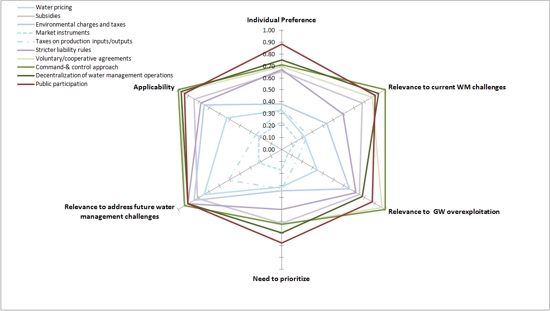|
In this issue:
The INECO Final Conference Event, Nicosia, Cyprus, June 11th 2009
Outcomes of the INECO Tunisia Case Study for addressing groundwater overexploitation
Ways of enabling effective public participation and stakeholder
engagement at local level in Cyprus
Policy recommendations for addressing water quality degradation in
the Barada River Basin, Syria
Towards a more efficient strategy for addressing water pollution
issues in rural areas in Egypt
The INECO
Guidelines and Regional Publishable Reports
The INECO Web Toolbox
The INECO Consortium |
|
Outcomes of the INECO Tunisia Case Study
Addressing groundwater overexploitation in Tunisia
|
|
Background - Identified responses to the issue at hand
|
|
Tunisia is a country facing increasingly severe water
shortage problems as a result of population growth, rising
living standards and accelerated urbanization. The
considerable pressure exerted on the available resources and
on the agricultural sector by these trends has led to a
significant increase in water use and pollution loads.
The severe overexploitation of groundwater resources is a
direct consequence of excessive abstraction for irrigation,
while the limited acceptance of water reuse as a potential
mitigating measure is a difficult obstacle to overcome.
Emphasis needs to be placed on the promotion of wastewater reuse
as an alternative water supply source, as well as to the
conservation of water in agriculture through the provisions
for incentives for less water-intensive crop selection and
for the application of irrigation methods with improved
efficiency.
During the first stages of stakeholder involvement in the
INECO Project, a number of potential mitigation options were
identified as relevant to the region and the problems faced,
including:
-
The introduction and strict enforcement of water abstraction
permits, in order to curb uncontrolled abstractions;
|
-
The introduction of voluntary programmes for water saving
and/or reduction in groundwater use, specifically targeted
to farmers;
-
The widespread implementation of awareness campaigns to
inform the public on the issues faced and to promote water
conservation;
-
The provision of pricing incentives to reduce groundwater
use, in the form of imposing groundwater abstraction
charges for both public and private boreholes;
-
The decentralisation of groundwater management activities,
and specifically the development of collective management
schemes to empower local communities and enhance the sense
of joint responsibility.
The suggested options were prioritized by the local
stakeholders through questionnaires distributed in 2
meetings held by CITET in the Agricultural Department (CRDA)
of Nabeul. In total, 64 stakeholders (technicians, farmers,
hotel owners, agriculture development groups and citizens)
participated and responded to the questionnaire.
The prioritization results are presented in the spider chart
below.
|
|

Results of the survey on the prioritization of alternative options
for the Tunisia Case Study
|
Analysis of policy pathways for problem mitigation |
|
The formulation of a policy proposal for mitigating groundwater
overexploitation was undertaken through dedicated interviews,
designed so as to allow elaboration on the
implementation of proposed approaches. 36 persons were
interviewed, representing major secondary stakeholders and affected user groups.
Results indicated support for a number of options including the regulation
and control of groundwater abstractions, the promotion of water reuse,
efficiency improvements in irrigation water use, and the strengthening of
the overall socio-economic and institutional environment, with emphasis on
the pricing of water services and the creation of cross-subsidies among
different water users.
Strongest
support/preference was shown for:
-
Measures related to water saving, and particularly
towards improving efficiency in irrigation, including
the encouragement of different cropping choices by the
Government, the provision of technical assistance to big
water consumers for water saving, and the adoption of
water saving standards for new irrigation areas.
-
The mandatory connection of water users to
collective systems that prevent individual abstractions and
the application of
volumetric charges to partially
recover relevant costs.
|
-
The involvement of the private sector in water
management and water service provision, as a potential
means to enhance the quality of provided water services.
-
The upgrading of the organisational level,
including the modernisation of management systems and
the enhancement of command and control regulatory
measures.
-
The promotion of public involvement and
participation in water resources management, and the
establishment of cooperative agreements among water
users.
-
The improvement of accessibility and relevance of
available information.
Stakeholder recommendations identified through the INECO
process could potentially significantly contribute to
mitigating the deterioration of groundwater resources,
particularly in the Cap-Bon region. Achieving this goal
however requires that authorities commit to the
implementation of the necessary changes, and that public
participation and community management of resources are
encouraged through capacity building initiatives and
further empowerment of water user associations.
More information on final Case Study
outcomes - The Tunisia Regional Publishable Report (3.32 MB)
|
 |
|

